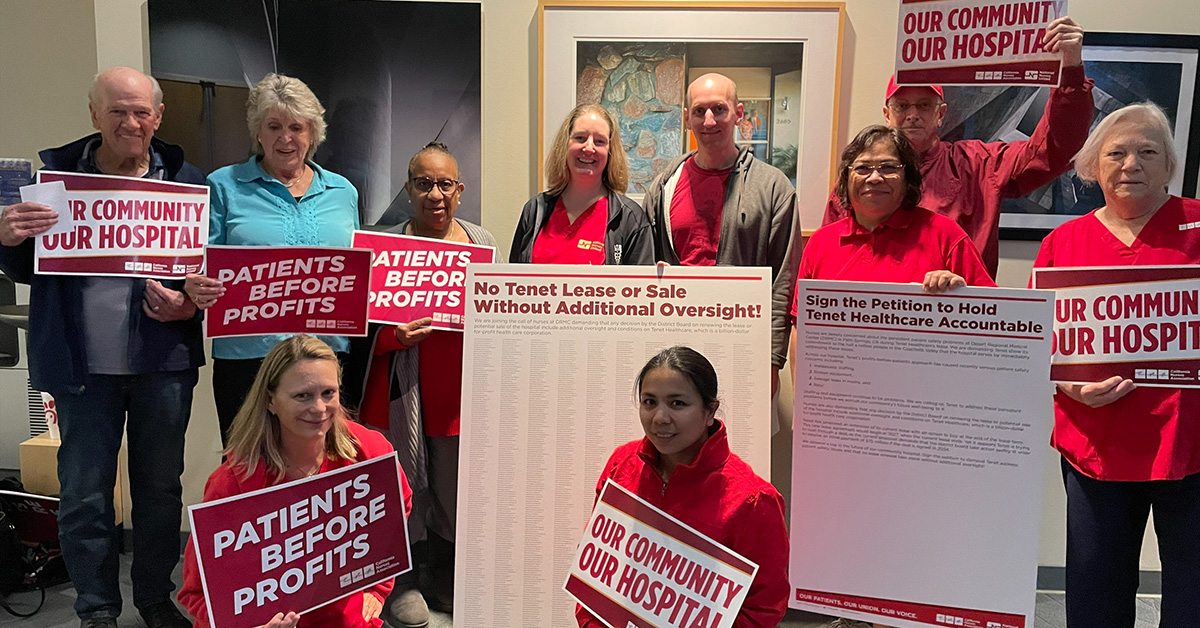Palm Springs nurses demand Tenet address patient safety

By Rachel Berger
National Nurse magazine - Jan | Feb | March 2024 Issue
In January, registered nurses at Desert Regional Medical Center in Palm Springs, Calif., attended a special meeting of the Desert Healthcare District Board to present a community petition with more than 1,600 signatories and more than 400 postcards from RNs. The petition and the postcards call on Tenet Healthcare to address the persistent patient safety issues at the facility and underscore the importance of the community’s input in deciding the fate of the hospital. The nurses also shared their concerns about the persistent problems at the hospital, including inadequate staffing, broken equipment, chronic plumbing issues, and rodents.
Tenet leases the hospital from the Desert Healthcare District and the for-profit company has proposed extending its current lease with an option to buy at the end of the lease term in 2027. As the board considers Tenet’s proposal to renew the lease of the hospital, the nurses and community members are recommending the board include provisions in any possible future lease that include oversight measures and a process for the board to impose fines on Tenet for failing to address structural and staffing issues.
“As nurses, we are committed to making sure that everyone who lives in the boundaries of the Desert Healthcare District understands that Desert Regional Medical Center is a public asset and, therefore, they are the rightful owners of the hospital, they have a right to decide what is the best course for the hospital’s future,” said Lori Ruggerio, a registered nurse.
Nurses also held an informational picket in December to demand Tenet address the chronic issues that jeopardize patient care in the neonatal unit and intensive care units. NICU nurses are being assigned too many babies to care for. ICU adult patients are being placed in non-intensive care units, a practice that began at the height of the pandemic as an emergency response to a crisis situation. However, the situation remains more than two years after this “quick fix” was instituted.
“Something cannot be an ‘emergency’ forever,” said Rachel Garcia, ICU RN. “Tenet needs to invest in a new ICU instead of housing patients in whatever space they can cut out of other units. These other areas are not appropriate for our patients. If Tenet wants to renew the lease, Tenet needs to prove to the community that it will put the resources we need into our hospital to make it the best place for our patients.”
The RNs are also demanding that Tenet immediately address the chronic problems at Desert Regional, including roof and plumbing leaks, lack of hot water in parts of the hospital, frequently broken elevators, and short staffing. Nurses say it is unconscionable that Tenet has failed to maintain the building and the facility.
Furthermore, the nurses are demanding that Tenet or any other future partner commit to the preservation of all current medical service lines and to expand the hospital so that patients are no longer held in the emergency room for long periods before they can be admitted to the appropriate hospital unit.
According to Tenet Healthcare records, Desert Regional Medical Center is its highest-earning hospital in California. In 2021, the hospital earned Tenet more than $130 million in profit, and in 2022 more than $77 million in profit. That Tenet was able to make so much money at Desert Regional may be in part to its exceptionally high charge-to-cost ratio: the ratio between a hospital's expenses and what they charge for care. For instance, in 2021, Desert Regional’s charge-to-cost ratio was 1,136 percent: for every $100 dollars of cost, the hospital charged $1,136. This charge-to-cost ratio is far above that year’s national average of 426 percent (or $426 charge for every $100 of cost).
“The community both deserves and needs Tenet to invest into our hospital, so we can provide the highest quality of care to our patients,” Deb Edwards, a registered nurse. “We need Tenet to recognize that our patients’ lives and well-being are at stake when administrators cut staffing and fail to maintain a clean, well-maintained facility.
Rachel Berger is a communications specialist at National Nurses United.